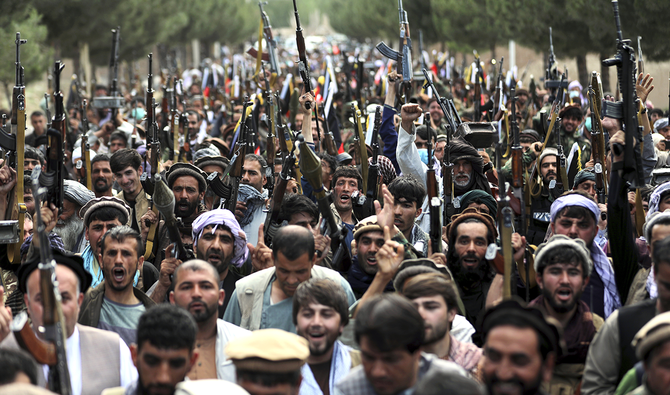KABUL: Afghanistan on Sunday defended its controversial decision to arm nearly 30,000 people to help troops limit the Taliban from making more territorial gains, which began with the phased withdrawal of US-led forces from the country on May 1.
“These are spontaneous local uprising forces to help national security and defense forces against the Taliban because these terrorists have committed brutalities in captured areas,” Tariq Arian, a spokesman for the Interior Ministry, told Arab News on Sunday.
He said these armed groups were not militia forces and would operate “under the scrutiny” of security sectors.
“We are not concerned that they will change into a threat but, if they act against the spirit of security forces, we will prevent that.”
Government resources for those wishing to join the “national mobilization” initiative are being channeled through factional and ethnic leaders, some of whom are accused of heinous crimes.
Factional militia bosses have repeatedly challenged past governments, including the administration led by President Ashraf Ghani, who pushed for the establishment of a “united front” and supporting local forces to strengthen peace and “safeguard the republic system" during a meeting with former anti-Soviet and anti-Taliban figures last week.
Arian added that 30,000 locals had either “unearthed their arms” or been given weapons and resources by Kabul. They belong to various regions where the predominantly ethnic Pashtun Taliban have captured several dozen districts from troops in recent weeks.
Defense Ministry spokesman Fawad Aman said that most “volunteers” were from the north, where ethnic Hazara and Uzbek loyalists of warlords blocked the Taliban from capturing the area over two decades ago.
Thousands of militants were massacred, and an equal number of Taliban were reportedly left to suffocate in shipping containers after surrendering to the militias during a US-led invasion in 2001.
“The number of these people keeps rising,” Aman told Arab News. “These are educated people who have picked up arms against the Taliban, and we can call them volunteers.”
Both officials said that the process of providing arms and resources to the locals “was not unchecked” and would not lead to another era of civil war similar to the 1990s after Soviet forces withdrew from Afghanistan.
The Taliban were unavailable for comment when contacted by Arab News on Sunday.
They have intensified their attacks in recent months, taking advantage of the reduced number of foreign forces amid an ongoing drawdown process which ends on Sept. 11.
The Taliban have overrun some strategic districts in the north, including in Kunduz where nearly 5,000 Afghan families fled their homes after days of fighting between the Taliban and government forces, according to media reports. There were also reports of an escalation in attacks in the provinces of Kandahar and Baghlan.
Ghani replaced his security chiefs last week amid increased Taliban gains, with newly appointed Defense Minister Bismillah Khan Mohammadi calling on “patriots and people everywhere to stand alongside their security and defense forces,” while assuring of the government's support to “provide all equipment and resources.”
Some parliamentarians backed the move to arm locals, while others expressed concern about providing them with resources through militia bosses.
Mohammad Ibrahim Gheshtelai, an MP from southeastern Paktia province, explained why the initiative was a win-win for all.
“The nation had the desire to defend the country,” he told Arab News. “That is why they picked up arms by welcoming the government’s proposal. The government found a good source for defending the system. This is good for the survival of the system. Majority in the parliament support this, and there is no serious concern about it.”
However Ghulam Wali Afghan, a legislator from southern Helmand province, told Arab News that Kabul needed to make sure that the resources were not “misused by thieves, human rights abusers and criminals” as, otherwise, it would be civilians who suffered the most.
Some critics warned that relying on former ethnic militia leaders and informal local fighting groups could further weaken Kabul’s control over the military's effort and risk a revival of “abusive and predatory behavior by warlords” against whose narrative Ghani came to power in 2014.
“It is solidly clear that the immediate and long-term threat that militias will pose is for sure,” Zabihullah Pakteen, a political affairs analyst based in northern Afghanistan, told Arab News. “However, the government has no option but to opt for militias to stand against the Taliban. Genuine public uprising and militias are two different things, yet we do not see a mass public movement to counter the Taliban.”
Others pointed to the “dangerous” precedent being set by the government including ethnic leaders.
“The uprising movement, or making of militias, is very dangerous for now and the future of Afghanistan,” said Nasratullah Haqpal, a Kabul-based expert in political affairs, as several ethnic leaders had committed brutalities during the civil war in the past. “The public is concerned about this. Leaders benefit from this process, and it may stoke ethnic tension, and this has to stop,” he added.
In recent weeks, the Taliban have fiercely criticized the deployment of local groups by the government, referring to them as “arbakis” or former local militias who were notoriously abusive, and accusing them of “fanning the flames of war” to maintain a grip on power.
They also warned that such groups would receive “stern” treatment from Islamic authorities.




























